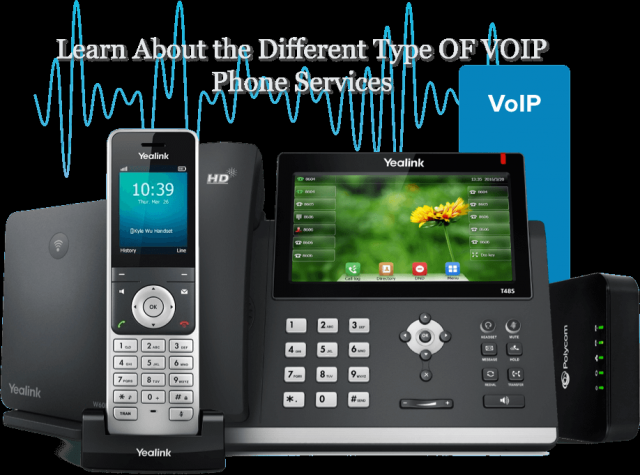The power of VoIP technology is its flexibility. VoIP calls can be made with traditional
tables, cellular devices, and desktop computers, thanks to digital data and internet
use. You can even convert conventional landlines to VoIP phones with special
converter boxes. As a result, there are many types of customers served by VoIP
providers, and many specialize in presenting specific segments of the market.
What is VOIP Phone Services?
VoIP phones are a kind of phone that uses IP technology to send calls. It can come
both in special digital hardware or programs (running on computers or cellular
devices) that perform the same function.
With a microphone and receiver, the VoIP phone takes the sound you produce and
turns it into a data package that sends through the network and exits via the internet.
At the other end, the phone compresses data and plays it back to hear other people.
How are VOIP Phones different From the Traditional Phone
system?
IN Case Business Phone Systems, Traditional Phones are connected via wire to
personal branch exchanges in the premise (PBX) – large equipment that allows the
system to connect all internal extensions. In this office telephone set, PBX is the
systems brain because it manages all routes and ensures all calls achieve their
goals through the Public Switch phone network (PSTN).
PSTN only refers to old school phones, where cellphones are connected to a
particular network – mainly used for home telephone connections. You might have
also heard about senior telephone services (pots). Both acronyms refer to the same
thing, with the latter a daily term for the first.
Advantage Of Using VOIP Phones
With an IP telephone system, you no longer have to keep the VoIP hardware and IP
PBX inside your office. You can choose to host, so you will get all the company’s
level functions you need in the telephone system without having to worry about
overhead costs to maintain the server in your building.
That’s because the modern VoIP-based cloud telephone system removes traditional
telephone limits, allowing computers and other connected devices to make phone
calls via the internet. It can do it thanks to the transport protocol responsible for
setting connections and ensuring data packets reach their goals.
What Are Different Type OF VOIP Phone Services?
There are various types of VoIP phones available, and each has a specific purpose.
Of course, the telephone table will work in conference settings – but you can lose
essential features without a conference telephone. It needs to be considered if you
plan to have a full VoIP deployment for your company.
Residential VOIP Phone Service
VoIP housing services are intended to serve households, adjust to serving only a few
lines for accounts. Beginning, VoIP housing services are designed to depend on
traditional landline telephone services, but today they often compete head-to-head
for customers. Housing services can take several different forms.
Many cable companies and VoIP bundle ISP along with other services. Other
housing providers sell converter boxes that allow you to make VoIP calls with
traditional home phones through an existing internet connection.
Phone-Based VOIP Service
Some VoIP providers, such as Ooma, focus on converting converter boxes for their
income than monthly service fees. This provider helps customers use an internet
connection to make calls with their landline. The box is connected to the internet and
the phone to digitize and send voice calls through the VoIP provider.
Providers such as Ooma can be the right solution for housing customers and small
businesses that need to have telephone services without interruption because they
do not replace existing home phones. They instead let you use your home phone
number via the internet. If you suffer from internet blackouts or power, the converter
box routes your call by telephone.
Software Based VOIP Phone Services
Services such as Skype and Google Talk fall into the VoIP-based software category.
This service is often part of the company’s product constellation, and it can take the
form of web applications or stand-alone desktop programs.
The decisive feature is that they provide front-end software to make phone calls with
computer and back-end infrastructure to set routing numbers and needs.
Business VOIP Service
VoIP business services are designed to serve a large number of users and traffic
under one account. Usually, they start from 20 individual telephone numbers and
scale up to thousands for large organizations.
VoIP is suitable for technical problems and unique costs facing organizations with
traditional home telephone connections. Not only quickly increases and falls when
adding and reducing users, but VoIP also eliminates international toll costs and
remotely.
Mobile VOIP Service
With the advent of smartphones and tablets, many VoIP services have aggressively
moved to an Android and Apple device market. Some of these services are related
to larger platforms such as Facebook messenger.
The other is a stand-alone brand such as Skype and WhatsApp, which serves both
businesses and consumers using smartphones and desktop computers. The main
difference between VoIP Mobile and VoIP-based software is that cellular applications
can use cellular internet services or local Wi-Fi networks to create and receive calls.
Cloud Hosted VOIP Service
VoIP services that are hosted Cloud are the latest in VoIP technology. It is also
known as a virtual PBX or IP PBX, but the technology is the same. This type of VoIP
service eliminates the need for most hardware in place because your VoIP provider
hosting all these functions use their hardware and servers.
The only real requirement is some essential network components (such as routers
and switches) and internet connections – that’s all. VoIP providers will usually take
care of maintenance, problem-solving, service redundancy, and more – take
responsibility, and down, far from business.
VoIP Cloud can also increase business productivity with services such as integrated
communication, video conferencing, smart call routes, and more.
Switching to VoIP may also help you save money for communication services. Long
and international calls are generally free with VoIP services. The only charge is for
internet access.








